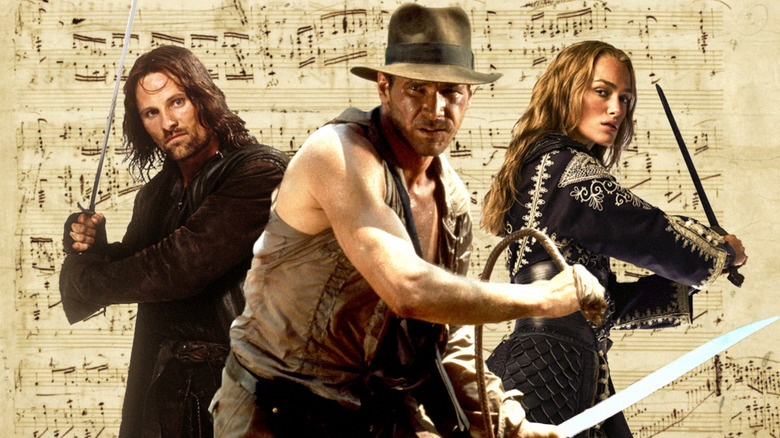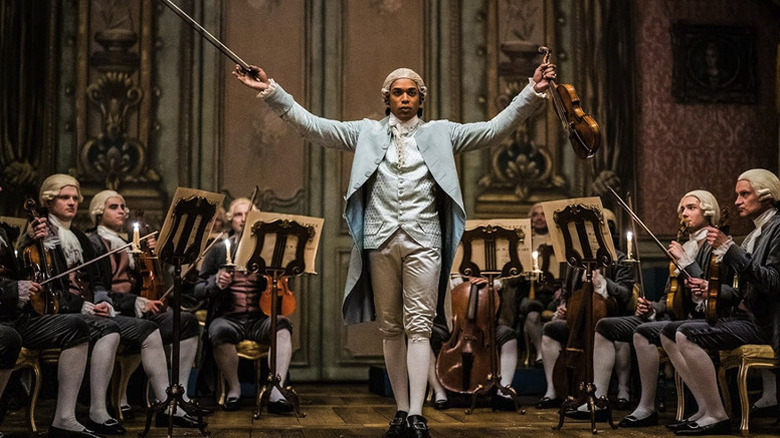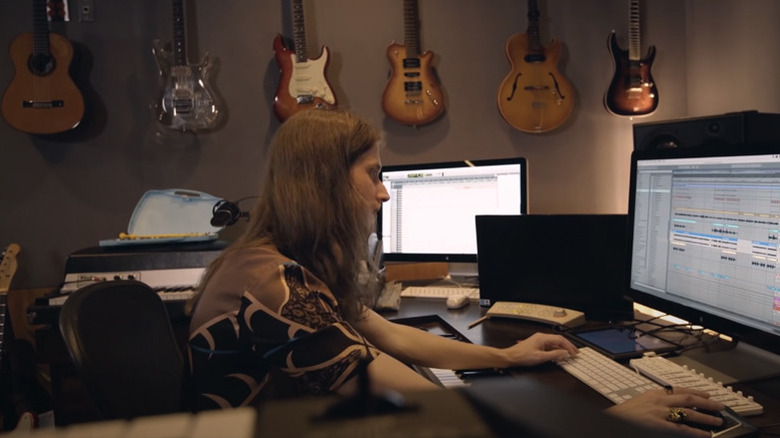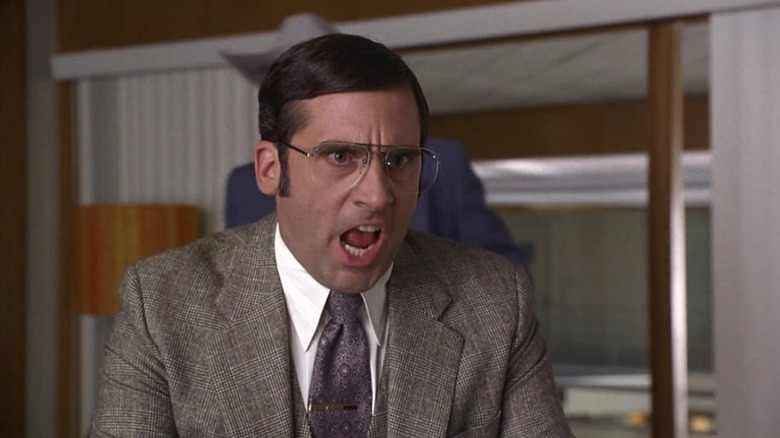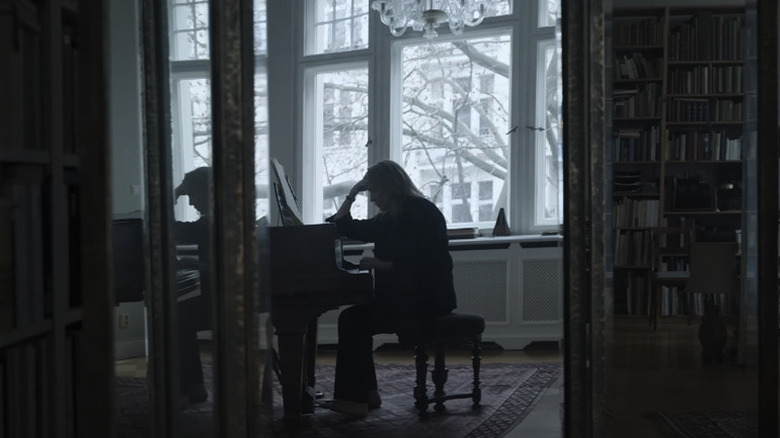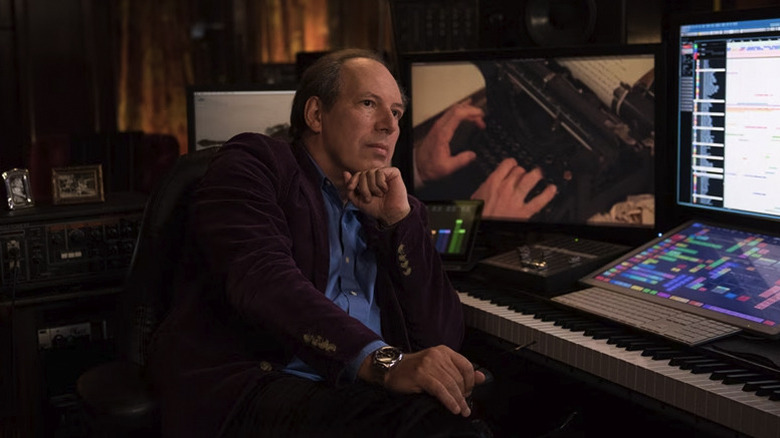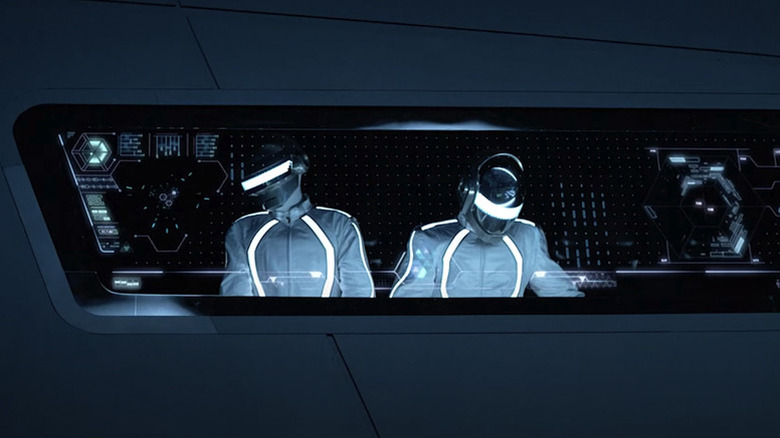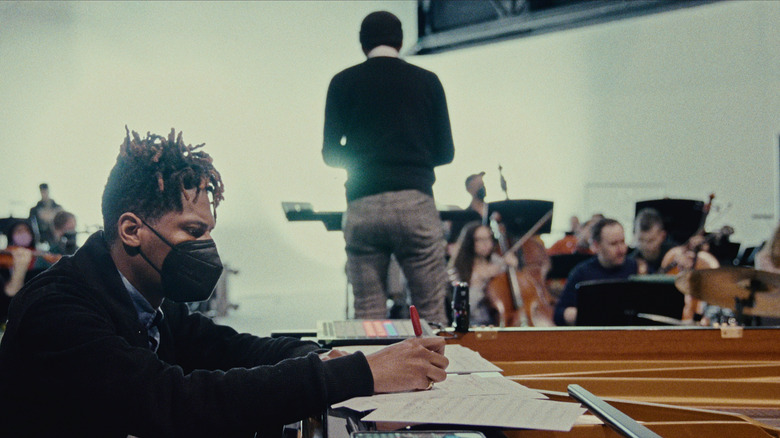Where Have All The Memorable Movie Themes Gone? Hollywood Composers Speak Out [Exclusive]
In a Variety profile of legendary composer John Williams earlier this year, director Steven Spielberg singled out a reason why the musician's work seems to stand out among his contemporaries.
"Every score he's ever composed, and even the ones that might have the most complicated orchestrations, he always has a beautiful main theme," Spielberg said. "And I don't hear themes being written for movies as much as they used to be by Jerry Goldsmith, Elmer Bernstein, Max Steiner, Dimitri Tiomkin and Bernard Herrmann. Film composition isn't a lost art, but thematic scoring is becoming more and more a lost art. And the great thing about Johnny is, he's still got it."
Of course, to say Williams has "still got it" is something of an understatement. The prolific composer is synonymous with the type of sweeping, powerful, emotional music that helped to define blockbuster filmmaking. A crucial part of why those scores clicked with audiences, helped drive films like "Jaws" and "Star Wars" to gigantic success, and continue to resonate today is the aspect Spielberg highlighted: recognizable main themes. Even people who aren't obsessed with movies can likely hum the themes from "Superman: The Movie," "Raiders of the Lost Ark," "Jurassic Park," and "Harry Potter." And his scores are full of leitmotifs — recurring themes typically associated with a specific character, idea, or scenario.
John Murphy is the composer of films like "Guardians of the Galaxy Vol. 3," "The Suicide Squad," "Kick-Ass," and many more. He sees John Williams as embodying this approach to creating film music. "In the 1960s, there were a lot of people saying the leitmotif was going to die because that was when songs started to appear in movies, and it kind of f***ed up thematic structure," he explained to me in a recent conversation. "But then we get into the '70s and John Williams arrives on the scene and he goes all the way back to the Golden Age and picks up where that left off before all these [diegetic] songs mess things up. And he did it so f***ing well and so elegantly and so masterfully. You want to learn about thematic structure? Listen to John Williams [...] you can hear how perfectly he's weaving dozens of motifs, and it's like watching an artist. I could never function thematically on that level, ever. There's this beautiful mix of pure talent and incredible education, and he did it so well that we all bought into the idea of themes and leitmotifs again."
While Williams sits at the peak of his profession (his Oscar nomination for Best Original Score for last year's "Indiana Jones and the Dial of Destiny" puts him at 54 Academy Award nominations, the most of any living human), he's obviously not alone in the ability to craft enduring themes and leitmotifs. Alan Silvestri's "Back to the Future," Danny Elfman's "Batman," Howard Shore's "The Lord of the Rings" trilogy — there are lots of scores with leitmotifs that have achieved icon status. But the apex of the era in which ultra-catchy themes are widely utilized appears to be behind us, and many people, myself included, have wondered why that theme-heavy approach to composing music has seemingly all but disappeared from the American blockbuster.
I reached out to several high-profile composers and music professionals to talk about this issue, curious if they even agreed with this premise in the first place. According to these industry veterans, there's something to the idea ... but the situation may not be quite as dire as it appears.
Themes have dropped off thanks to a stylistic evolution
David Krystal is an orchestrator who has worked on blockbuster movies like "Dunkirk," "IT," "Creed III," and many more. When I spoke to him about Hollywood's different approach to scoring, he pointed out that he's absolutely noticed a change over the past 20 years and referred to it as "a stylistic evolution," comparing it to other changes that have occurred across different forms of entertainment.
"It's kind of like with pop music, where if you turn on the radio today, it's not going to sound at all like it did 30 or 40 years ago, because things get played out and then people want to change styles, change sound," he said. "I think the same thing has happened in film music. There has been a modernization of sound that isn't quite as focused on having as prevalent, as present, of a melody everywhere. I think it's similar to pop music in that there's more of a focus on rhythmic drive and on music production and sound synthesis and creating really cool textures and unique sounds. But the kind of traditional, I'd even call it kind of operatic scoring, where every character has a theme and where the music is the most present thing in the soundscape, it's just tastes have changed. Tastes of filmmakers, and I think probably tastes of audiences, too."
Krystal has experienced working on projects with beautiful melodic sequences, only for that music to then be drastically turned down in the final sound mix, and he's also been in scoring sessions where filmmakers have changed their minds and either simplified or outright removed some of that melodic material. Based on his observations, he suspects many modern directors might consider a theme-heavy score to be "a bit old-fashioned."
John Ottman, the Oscar-winning editor who is also a director, producer, and prolific composer and orchestrator (he wrote the score for "The Usual Suspects," "X-Men 2," and "Superman Returns," among many others), calls that mentality "heartbreaking and infuriating" because of the missed opportunities that are being left unexplored.
"There's this feeling that to write a theme now is to immediately make your film feel dated, and that any theme is going to have a dated sound on the film," he said. "Which is completely untrue, because themes themselves can be updated too and still maintain the classic thematic structure — the ABA structure. I think that's a shame, because a lot of opportunities for movies to have that signature sound when you walk away, and have an identity for themselves, have tragically fallen by the wayside."
The technological revolution is also a contributing factor
Another reason for the drop-off in thematic scoring has to do with the leaps forward in technology that have occurred over the past 25 years. The introduction of non-linear editing and digital audio workstations made it far easier for directors, sound teams, and editors to try new techniques and introduce layers upon layers of new sounds into a mix. That has resulted in groundbreaking work (it's impossible to imagine the mind-melting complexities of Best Picture winner "Everything Everywhere All at Once" being able to be executed in an earlier technological era, for example), but as with any innovation, there have been some unintended or unforeseen consequences. Armed with this collection of flashy new tools, Krystal said filmmakers are no longer "falling back on the kind of traditional operatic, melodic scoring that there used to be."
"In the overall soundscape of films, there are more things that compete than there used to be," he continued. "There's the sound effects, for sure. But also even just sound design creating synthetically a real cool atmosphere sonically for the film. Sometimes that's on the composer side, sometimes it's on the sound designer side. But it used to be where I'd feel music was the main sonic driver of the movie, and today there are multiple things competing. So you probably notice the music a bit less than you used to."
Technological advances have exponentially increased the number of options available for a filmmaker in terms of a movie's soundscape, but one of the downsides to that deluge of new options is that a director's vision can become murkier than it may have been otherwise. Composers can run into the hurdle of a lack of shared language when it comes to communicating with filmmakers about movie scores. Oscar winner Rachel Portman, the composer for a range of films including "Emma," "Hart's War," and "Never Let Me Go," says composers often need to be mind readers in terms of translating what filmmakers actually want.
"Directors often come and say, 'Oh, well, it'd be great if the characters have different music or they have a different theme,'" she said. "They think they want a different theme for all the different characters, and that may or may not work out like that. Musical language for a lot of directors is really rudimentary. Which is fine, because they don't need to be — they're not composers. And it can also lead to you going down wrong tracks, because they tell you something and they think, This is what I want. And then it turns out they didn't want that at all, but they didn't have the tools with which to describe musical language."
Technology also rears its head in the practical, boots-on-the-ground process of crafting the music and locking it into the final cut. In eras past, the director could still incorporate a score into the mix at their discretion, but the entire score would often be written and recorded without their step-by-step feedback.
"In the scoring world, what used to happen is you used to spot out the film: [The director and the composer would] go over where there was going to be music, you would discuss what kind of music, and maybe you'd play some samples on the piano, but then [the director] basically wouldn't hear it until you went to go record," Krystal explained. "So it did give the composer more of an opportunity to craft this well-developed, melodic score. Whereas today, you're scoring one individual scene at a time and sending it, a lot of times, for approval with samples playing. So I think that filmmakers, it's definitely a different process for them, seeing things early and getting to evaluate and decide, 'Oh, do I want the melody there or not?' or, 'How is this all going to link together?'"
The scourge of temp scores
Two words send shudders down the spines of film composers everywhere, and must be taken into account when considering this subject: "temp score." As someone who's served as both a composer and an editor, John Ottman has a unique relationship to temp scores, and explained what frequently happens during post-production before a composer is hired to create a score:
"When an editor wants to sell a scene [for the producers' or director's approval], he wants to put music in there so it sells it even more. But the moment you put that music in there, forever it'll be associated with that piece of music and no one can imagine anything else. And as you know, temp scores are just thrown in a lot of time by editors, and a lot of editors aren't necessarily musically inclined. So they're like, 'Oh, that'll happen all later. I'm just putting this in as a functional thing.' But then everyone is so associated with it, they just want that thing that's just functional. So then you end up with a score when the composer's called in, [the director or producers] say, 'Just do that,' and it ends up being a merely functional score. The potential that the score ever had is destroyed the moment they put in some temp music."
If it's not abundantly clear from those comments, composers loathe temp music — and for good reason. The insidious consequences of that process can be debilitating for creativity. In 2015, composer Jon Brion ("Eternal Sunshine of the Spotless Mind," "Magnolia") shared a particularly illustrative story about his experience on the Off Camera podcast: "I've been forced to copy things to the point of tears, where I'm crying in front of people — literally — going, 'We're here. You're going to have a full orchestra. You have me. I'll make as many versions as you want for this cue. You can throw them out time and time again, but we can find something new together.'"
Michael Giacchino, the Oscar-winning composer of "Up," "The Batman," and the TV series "Lost," did not hide his frustration with this common Hollywood practice. "A lot of directors are very insecure," he told me. "They do not trust something when they feel like, 'Is this too emotional? Am I being too emotional?' and they want to pull way back. They're robbing themselves of actually making a real story that people can connect to when they do that. 'No, no, just put repetitive notes back through the whole thing and that'll be great. And we'll distract the audience from thinking about the characters.' Well, that's like the worst thing in the world. What are you doing? But I do think so much of it comes out of insecurity and not really understanding what the orchestra is. They are so used to their temp scores. They can't get over the fact that something new can do the same thing for their movie that they believe the temp score was doing during editorial."
Ottman said he viewed temp scores as so much of a problem that he would edit movies "dry," with no music, specifically to avoid those early associations taking hold in directors' minds. "Inevitably, it's easy to temp a scene with music that kind of just sits there like wallpaper" as an editor, he said, especially with editors coming up against tight deadlines. But once that sonic wallpaper is in place, Ottman sighed, "the incoming composer is screwed, unless they're super opinionated like me. But even if they are, a lot of composers are newer in their careers and so forth, [so] they're not going to sit there and say, 'Hey, this is wrong. This is wrong. This is wrong.' They're going to try to get through the project so they can get another movie, because they have to make an income."
Writing movie themes is hard work
"I've always thought, if you write a theme that starts at the beginning of a film and then it plays in bits, the end of the film has an enormous emotional resonance because the theme is there at the end," Rachel Portman said. "It's an extraordinary alchemy of storytelling with the music, and it lands a much bigger emotional punch — if the film requires that — if there's a melody." The trouble is, writing themes isn't as easy as it may sound, especially with deadlines looming.
"Part of the other reason for this failure of themes to be more present these days is that they're hard work," John Ottman said. "It takes a lot of concentration, a lot of skill and effort, to have the discipline to sit down as an entire film has confronted you where you just want to dig into and start because you have a deadline. To not go there and actually sit down and write your themes out, it's agonizing because you want to start scoring the film. But I always tell people that work you put up front in doing that is going to save you so much time when you go to score the film, because you now have figured out your themes after you've watched the film a couple of times. And it's just going to write itself, in a way."
Hildur Gudnadottir, the Oscar-winning composer of HBO's "Chernobyl" and the 2019 movie "Joker," agreed that the realities of post-production schedules can also be a huge factor in whether a blockbuster movie has a recurring theme. "For films that require really fast editing, both in pace and turnaround, it's easier and more effective to edit to music that's more rhythm- and texture-based than melody-based," she said. "Today's blockbusters tend to be really fast-paced and with a pretty tight postproduction schedule. Slower films with longer scenes have more space for longer leitmotifs."
Every composer I spoke to for this piece acknowledges that leitmotifs and themes are not necessarily appropriate for every type of movie score; no one is advocating for applying one particular style across the entire breadth of the cinematic landscape. But as the types of movies that receive greenlights in Hollywood have changed over the past few decades, the overall sentiment is that the films coming out now frequently don't have enough breathing room in them for the types of grand themes from the heyday of the '70s and '80s. "We don't have 'Dances with Wolves' or 'Out of Africa' anymore," Ottman said. "I mean, there are [films like that] here and there. [But] there's very little time for a composer to have a moment to establish a theme, to play out its full form in a scene."
"As a filmmaker, I believe that — obviously this is an overused term, but the score is the soul of the movie," he continued. "And if you can walk away humming something, forever that movie has an identity, and that theme's going to remind you of that film forever. A drone or an ostinato really is not going to make me remember a specific film, unless perhaps it has some really kick-ass motif in it that's so catchy that I'm going to identify it with that movie."
Muddled ideas may also be a culprit
Hans Zimmer is one of the most famous composers on Earth, but unless you read industry trades or pay close attention to entertainment news, you may not realize that he doesn't actually compose the entire score for the movies he works on. Zimmer is the public face of a company called Remote Control, which essentially serves the function of something akin to a musical assembly line. Zimmer does some work, yes, but much of it is delegated to legions of his proteges who tackle various aspects of creating film scores, including generating original cues. I don't mean to pick on Zimmer here; he certainly isn't the only composer to engage in methods like this, he's just the best-known face of the practice. In 2022, Vanity Fair called this figurehead approach "film composing's biggest open secret" and quoted a now-deleted tweet from composer Joe Kraemer ("Jack Reacher") as saying, "I can count the number of mainstream Hollywood composers that I KNOW write all their music themselves on one hand" — a pretty damning statement for those of us who assumed all composers individually toiled away to produce their own scores.
"Back in the day, even with me, the concept of working with other composers on a score was like, what? That just sounds wrong," John Ottman recalled. "I grew up in that John Williams, Jerry Goldsmith, John Barry era, where if I heard that they even had anyone writing anything for them, I'd be petrified. My point by saying that is that when those composers were on a movie, that one movie was their world. Sometimes it happened that there was overlap between one movie and another, but they weren't working on five movies at the same time. So they had time to devote to that one movie to impart their own soul, as it were, musical soul, to that film and not a team of five, ten, fifty people."
In this episode of the Twenty Thousand Hertz podcast, sound designer and host Dallas Taylor spoke with several musicians and technicians who work under Hans Zimmer about the themes that are woven throughout Zimmer's score for Denis Villeneuve's first "Dune" film. "If you look at something like 'Dune,' for instance, there's three themes, maybe four themes in the whole movie," said composer Steve Mazzaro. "A lot of them are very subliminal. You might not necessarily notice them."
Raul Vega, a sample developer, digital instrument designer, and musician jack of all trades who helped create the sonic palette for Zimmer to work with on this score, chimed in: "When you listen to the score, you may not be getting something that is so motif-heavy in a vein of, 'Here's our theme and this is exactly what it is. This is the orchestra.' You're getting so many different layers of texture that are representing all of these different elements and grains of sand [...] the samples are the sand, and how they move apart and move up and down and every which way you can think of in the score, there's something really beautiful about that."
Personally, I think the "Dune" score is terrific. It's one of the few blockbuster scores of the past several years with a theme that got me amped when I heard it, and the complexity of the music feels like a natural extension of the gargantuan scope of that story. But as John Ottman pointed out, once a large team is introduced into the scoring process and a composer begins to be stretched across multiple projects at once, "the scores are going to inevitably suffer in terms of having a musical identity." When that happens, the stamp of the composer begins to disappear, it becomes more difficult to recognize a person's work solely from listening to it, and some of that human touch, the distinct personality that composers bring to their work, can get diluted. Whether or not that's happening to Zimmer doesn't seem to matter to the entertainment industry: He won his second Oscar for the "Dune" score.
"Most composers working today, I couldn't tell their music apart from another composer," Ottman continued. "That's because this cool factor thing, so to speak, that came in where there's really no theme. It's a three-note motif, and that's the theme of the whole movie."
There's not a wrong way to write film scores
For Rachel Portman, the decline in thematic scoring is linked to music being more omnipresent in film scores than it used to be. "I always used to fight for music just not to be constant, because I think it's so much more powerful when it's not," she said. "But certainly in big blockbusters, it feels like there has to be a ticking of a soundtrack the whole time, the entire time. Which is completely exhausting. But, I mean, it's incredibly effective. And often it can feel like a bed, like a sound design. It's sort of morphing between sound design and actual composition, and I think that has a lot to do with the development of samples and electronica, basically, and all this stuff that can be manipulated now to be music. I don't tend to work with that. I write at the piano and I tend to work with orchestras, so it's working from a completely different [place], and I think that has had a lot to contribute to the way in which people write. They're not coming at it from a classical background in the same way, and I think that leads to less melodies [...] I think there's room for all kinds of music in film, and I really celebrate and enjoy the differences that so many really interesting young, new voices are coming in. But I do also think that some of us approach writing music so differently that writing a melody is impossible, because that would be really hard. Whereas for me, writing what they're doing would be really, really hard, too."
To further illustrate Portman's point, John Murphy, who is on the opposite end of the composing spectrum, offered his own insights into the distinction between types of modern composers. "We've got 'Oppenheimer,' that's got its motifs. And that just won the Oscar, didn't it? That's a good example of a modern composer using a very, very old form, but in a very modern way," he said. "And Hildur does it well with the 'Joker' [score]. It was great. I can't imagine that theme being a theme in 1945, but in the context of this dystopian world that that movie was set in, it was perfect. That grungy, repetitive, laconic, ugly sound was perfect for that movie."
For Murphy, thematic scoring is still alive and well in modern blockbuster film music, but it's morphed into a different form, thanks in part to these different approaches of different composers:
"I think one of the reasons why it's changed so much recently is, it's something that I've gotten the benefit from, but the whole film score community now, it's not the monopoly of the classical composers that it was even up until the '80s. You've got composers like Hans Zimmer, you've got Trent [Reznor] and Atticus [Ross], Clint Mansell, me: We didn't go to music school, we came out of bands. I was in a punk band. Clint was in a kind of pop punk band. We just come at it from a wholly different thing. So none of us ever learned composition or harmony or any of these things. So we just have a different DNA. So to us, I think to this generation that's doing a lot of these big films now — certainly Hans is doing all the big films — I think our DNA is more pop-based. I think it's about the bands we loved, not about the composers we loved. It's about the bands we grew up with. And so I feel like I don't write themes, I write riffs, because I used to write on a guitar. So for me, a great theme is a da-na-na-na-na or a great riff, and I don't question it. If it works, it works. So I think that's one of the biggest reasons why the leitmotif has changed, is you've got a lot of people now who are having a big influence on film music who never had a music lesson in their life, but they intrinsically understand that the idea of a recurring idea that can help tell a story is incredibly powerful."
Themes are still with us, they've just evolved
As I was speaking with John Ottman, he said something that's stuck with me: "The best scores are those where you can listen to them away from the film and you can hear a story being told. Those are the best scores because that's what a score should do, is tell a story." Noticing themes and leitmotifs has been the easiest and most identifiable way for me to understand that sonic story being told, which is why I care so much about this subject.
For a young Michael Giacchino, listening to a film's score on its own could conjure memories of the narrative of its movie, or the music could serve as a launchpad into whole new realms of personal creativity. But themes were crucial to that experience, too. "When you walked away from 'Jaws' or 'Star Wars' or 'Vertigo,' whatever it is, you remember that score and it's so embedded in the story of that film, and it's really important," he said. "That's what I loved about it. I loved sitting home at night as a kid listening to these scores and reliving the movies in my head, or creating brand new stories in my head based on it. That was great. That's hard to do when it's just a da-da-da-da-da-da-da-da kind of a thing."
But under the right circumstances, more unconventional approaches can pack the same emotional wallop as a more traditional theme.
"My favorite score of last year by a long shot was 'Past Lives,'" John Murphy explained. "It had this lo-fi and this magic to it and this innocence that I just love [...] but I couldn't hum the theme from 'Past Lives.' [...] But what was happening was there was a very, very clear thematic structure in that score. The reason we can't hum it or sing it out as a 'la, la, la' [type of theme] is it wasn't designed that way. Very early in the film, I forget what it's called, but it's like a love theme, and [the characters are] just children and it's innocent and it's pure [...] It had that beautiful sensibility and it was magical and it wasn't even a chord. It was almost like sound design. But f***, was that powerful. And then when it recurred — because that's the whole idea of a leitmotif or a theme — when it recurred when [Hae Sung] was a little older, it was like, 'Whoa.' That to me was an incredibly powerful and incredibly cinematic leitmotif, but it wasn't what we would think of as a theme: dah, dah, dah, dah, dah, dah. It wasn't that. But make no mistake, that was absolutely a very clever and very powerful leitmotif."
The best scores tell a story, and those clearly defined, memorable, recurring themes we all grew up with used to be an essential part of that process. As tastes and technology continue to transform, filmmakers may not be relying on them in the same way, but they'll never fully vanish.
"A leitmotif or a theme can tell the audience things that the camera can't," Murphy said. "It can go inside the actor's head. It can tell you what the director is feeling. It can throw questions at you. And it's way too powerful a tool for the storytelling to ever disappear. I just think it'll just keep evolving in the way that cinema evolves."
